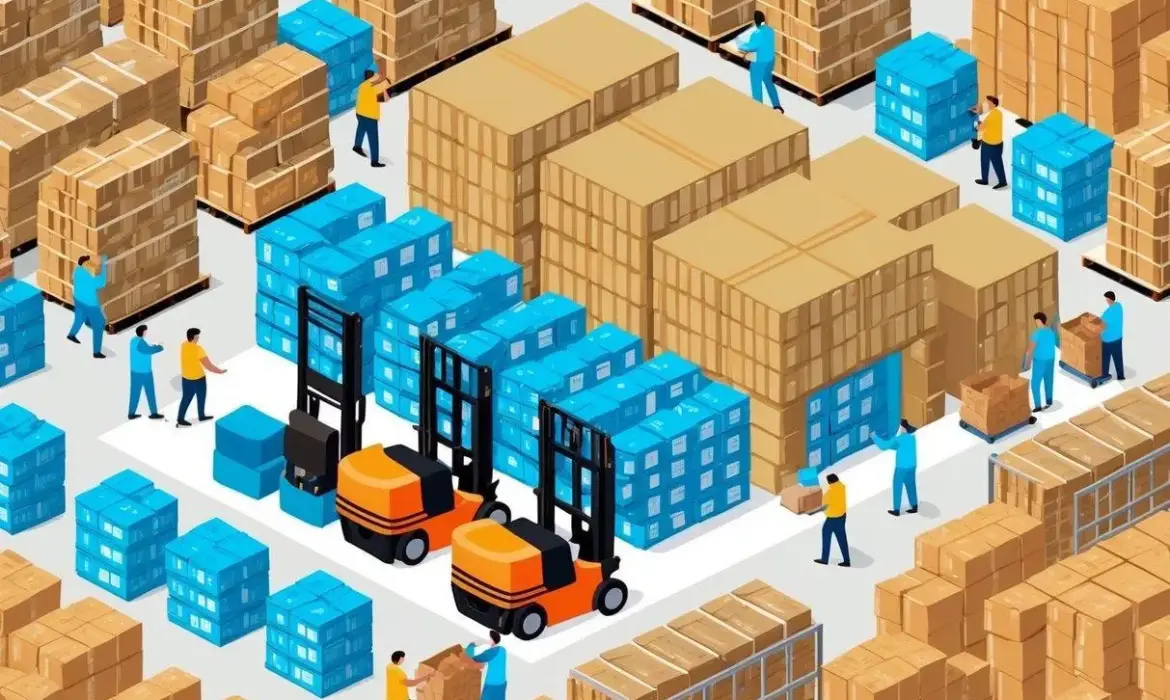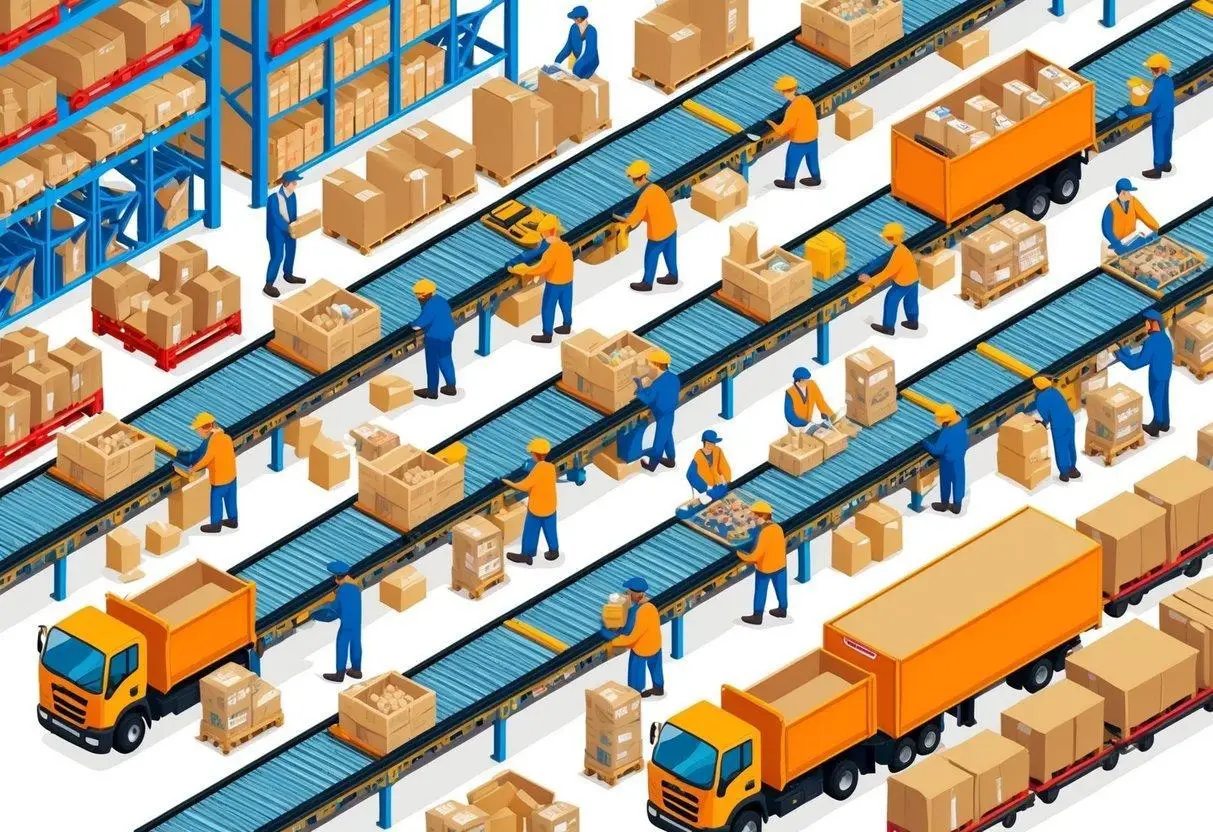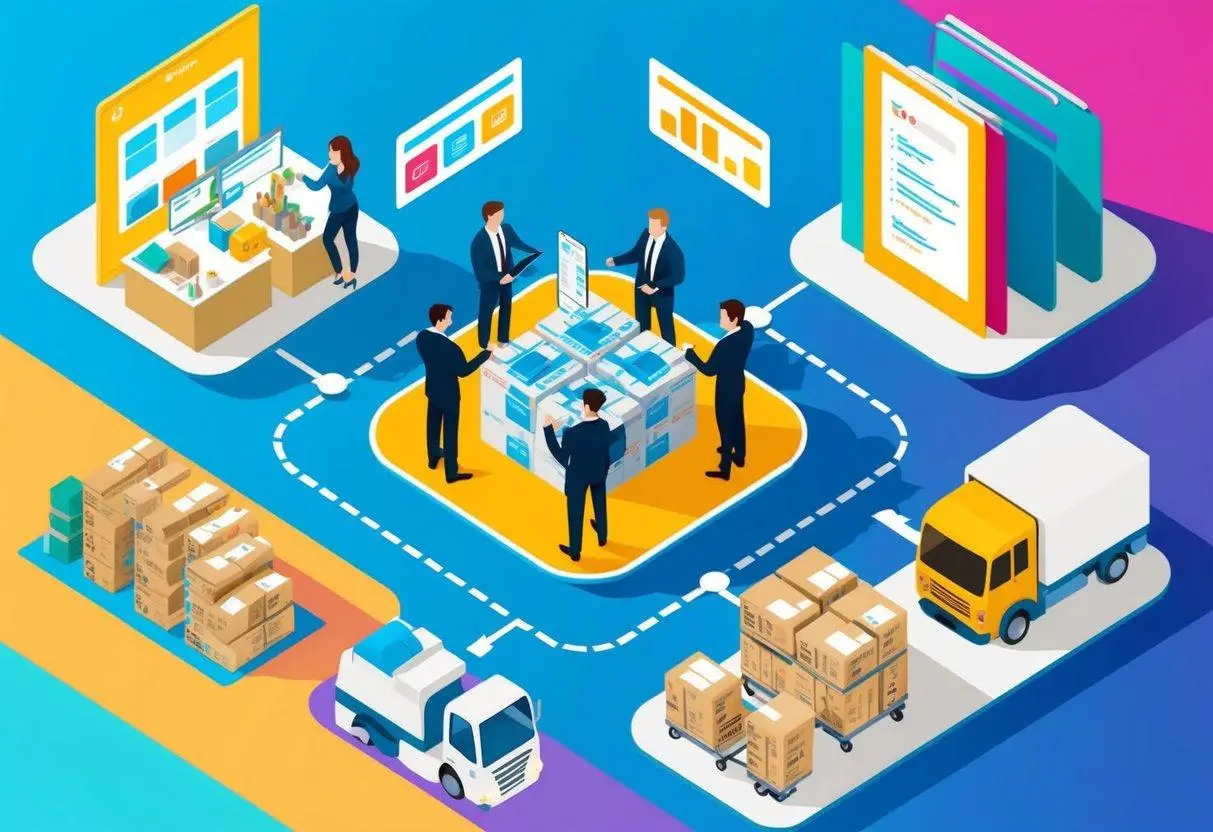B2B Fulfillment Services: What Growing Manufacturers Need to Know

Is your manufacturing business hitting a growth ceiling because of logistics challenges? B2B fulfillment services offer a solution that transforms logistics from a bottleneck into a competitive advantage. While you focus on creating quality products, the right fulfillment partner manages the complex logistics of storing, packing, and shipping large B2B orders. This partnership lets you concentrate on product development and customer acquisition without diverting valuable resources to operational burdens.
What is B2B Fulfillment and How Does It Differ from B2C?
B2B fulfillment services manage the entire order cycle for transactions between businesses—from receiving inventory to storing products, processing orders, and shipping completed packages to business customers such as wholesalers, retailers, or other manufacturers.
Modern B2B fulfillment connects your production capabilities directly with your customers’ needs through sophisticated inventory systems, order processing technology, and integration with business management platforms.
B2B fulfillment differs significantly from consumer fulfillment in several key ways:
| Aspect | B2B Fulfillment | B2C Fulfillment |
| Order Volume | Bulk quantities (pallets, cases) | Single or few items per order |
| Shipping Methods | LTL freight, full truckload, specialized carriers | Parcel services (USPS, UPS, FedEx) |
| Relationships | Long-term contracts with specific requirements | Transactional, often one-time purchases |
| Integration Needs | ERP systems, EDI connections, accounting platforms | E-commerce platforms, marketplace connections |
| Packaging | Industrial packaging, palletization | Consumer-friendly, branded packaging |
Manufacturers need fulfillment partners with specific B2B expertise who understand commercial shipping requirements, freight management, and the precision needed for business relationships where every error has magnified consequences.
Why B2B Fulfillment is Crucial for Manufacturers
Third-party B2B fulfillment services transform logistics from a cost center into a strategic advantage for manufacturers in two key ways:
Scalability Without Capital Investment
In-house fulfillment operations frequently become chokepoints for growing manufacturers. B2B fulfillment specialists provide built-in scalability without requiring proportional increases in staff, space, or systems.
During peak seasons, a dedicated fulfillment partner adjusts resources automatically to accommodate volume fluctuations—whether that means holiday rushes, promotional periods, or unexpected growth spurts.
The existing warehouse network provided by fulfillment specialists offers immediate geographic coverage without capital investment. This infrastructure converts what would be fixed expansion costs into variable expenses that align with actual business volume.
By outsourcing fulfillment operations, manufacturers also free up internal resources—both physical space and personnel time. Production areas previously used for storage can be reclaimed for manufacturing, and management attention shifts from logistics challenges to core business functions.
Enhanced Customer Satisfaction
Meeting modern B2B customer expectations requires precision and reliability that dedicated fulfillment services excel at providing. Today’s business customers demand the same seamless experience in their professional purchasing as they enjoy as consumers. Many manufacturers are finding that e-commerce 3PL services offer the expertise needed to meet these expectations across both B2B and B2C channels.
Professional B2B fulfillment centers maintain higher order accuracy rates than most in-house operations. This precision prevents the costly disruptions that occur when business customers receive incorrect shipments.
With strategically located fulfillment centers, manufacturers can position inventory closer to key customers, reducing transit times and shipping costs. This geographic advantage helps meet tight delivery windows that many business customers now expect.
Transparent inventory and order status information further enhances the customer experience. Modern fulfillment partners provide real-time visibility that allows manufacturers to keep their business customers informed about product availability and delivery timing.
Essential Components of Effective B2B Fulfillment

Successful B2B fulfillment operations depend on three interconnected systems working together seamlessly:
Integrated Order Management
Robust order management serves as the foundation of effective B2B fulfillment, handling the entire lifecycle of orders from initial receipt through processing, shipping, and post-delivery support.
For manufacturers, order management systems must accommodate various order types and sources, whether through EDI connections, online portals, email, or traditional purchase orders. Advanced fulfillment partners provide systems that centralize these diverse inputs into a unified workflow.
Order validation prevents costly errors by confirming that orders can be fulfilled as requested before processing begins. This step is especially important for B2B orders that often contain specific requirements regarding shipping methods, delivery timing, and documentation.
Integration capabilities with both manufacturer and customer systems eliminate duplicate data entry and provide real-time information flow across the supply chain.
Precision Inventory Management
Accurate inventory control directly impacts both operational costs and customer satisfaction in B2B fulfillment.
Real-time inventory visibility across all storage locations prevents stockouts and allows for effective inventory allocation. This visibility helps manufacturers make informed decisions about production schedules and inventory investments.
Batch and lot tracking becomes particularly important for manufacturers with expiration-sensitive products or quality control requirements. Advanced fulfillment systems maintain detailed records of manufacturing dates, lot numbers, and expiration information, ensuring proper rotation and traceability.
Professional fulfillment centers typically achieve inventory accuracy rates exceeding 99%, significantly higher than most in-house operations can maintain consistently.
Strategic Warehousing and Distribution
Warehouse network design should align with customer locations and transportation costs to optimize both speed and expenses.
Within warehouses, layout and process optimization dramatically impact both speed and accuracy. Professional fulfillment centers arrange inventory based on picking frequency, compatible storage requirements, and operational workflow.
Technology applications like barcode scanning, RFID tracking, and voice-directed picking enhance warehouse efficiency, verifying accuracy at each step while increasing productivity compared to paper-based processes.
Distribution network optimization connects warehousing with transportation planning to identify the most cost-effective shipping methods while meeting service commitments.
Choosing the Right B2B Fulfillment Partner
Selecting the appropriate fulfillment partner represents one of the most consequential decisions for growing manufacturers. Focus on these critical evaluation factors:
Industry-Specific Expertise
Partners with specific experience in your industry understand your unique challenges and requirements without extensive education.
Industry-specific expertise extends beyond basic knowledge to include established solutions for common challenges in your sector, whether that’s handling fragile items, managing temperature-sensitive products, or accommodating seasonal demand fluctuations.
Relevant certifications and compliance understanding validate industry expertise. Depending on your products, partners might need specific certifications for handling food, pharmaceuticals, hazardous materials, or other regulated items.
Ask for specific examples of their work with similar manufacturers, including case studies and references from companies in your industry.
Integration Capabilities
Your fulfillment partner should offer seamless connections with your ERP system, e-commerce platform, or order management software. These integrations eliminate manual data entry, reduce errors, and provide real-time information flow.
Advanced warehouse management systems optimize picking routes, manage inventory locations, track worker productivity, and maintain accuracy records. The sophistication of a partner’s WMS directly impacts their operational efficiency.
Look for partners offering customizable dashboards, automatic report generation, and data export capabilities that support informed decision-making.
Evaluate a partner’s technology roadmap to ensure their capabilities will continue supporting your business as it evolves.
Customer Support Quality
Responsive, knowledgeable support proves especially valuable in B2B fulfillment, where order issues can have cascading effects on business operations.
Dedicated account management provides personalized attention and demonstrates commitment to your business success. Your account manager should thoroughly understand your operations and proactively identify improvement opportunities.
Issue resolution procedures reveal much about a fulfillment partner’s operational philosophy. The best partners take ownership of issues and communicate transparently throughout the resolution process.
When evaluating support quality, look beyond sales promises to operational reality by speaking with existing clients and reviewing detailed service level agreements.
Streamlined Steps in B2B Fulfillment Management

Understanding the operational workflow helps manufacturers evaluate and optimize their fulfillment partnerships:
Smart Order Processing
Effective fulfillment systems capture orders from multiple sources—EDI transmissions, online portals, emailed purchase orders—consolidating them into a unified processing workflow.
Verification procedures confirm order accuracy and feasibility before processing begins, catching potential issues early to prevent costly errors later.
Order prioritization routes incoming orders based on service level agreements, shipping deadlines, and business rules. This intelligent sequencing ensures that urgent orders receive appropriate attention.
Documentation preparation generates specific documents needed for customs clearance, regulatory compliance, or customer receiving procedures while reducing administrative burden.
Efficient Fulfillment Operations
Inventory allocation assigns specific units to pending orders based on factors like lot numbers, expiration dates, and storage locations to prevent shipment of near-expiry products while optimizing picking efficiency.
Many manufacturers benefit from specialized pick and pack fulfillment services that maintain high accuracy while processing diverse B2B order types. These services employ trained staff and advanced systems designed specifically for business-to-business shipment requirements.
Quality control checkpoints verify that picked items match order requirements before packing begins, using barcode scanning, weight validation, or visual inspection depending on product characteristics.
Value-added services like kitting, custom labeling, light assembly, and special packaging might be required for specific customers or markets, so confirm that potential fulfillment partners offer these services when needed.
Regular analysis of picking patterns, travel paths, and processing times helps identify bottlenecks and refinement opportunities that increase throughput while reducing costs.
Optimized Delivery and Returns
The optimal carrier for each shipment depends on factors including destination, timeline, parcel characteristics, and service requirements. Advanced fulfillment systems make data-driven carrier selections that balance these factors appropriately.
Shipping cost management strategies help control transportation expenses without sacrificing service quality, including zone skipping and dimensional weight optimization.
Proactive notification systems alert stakeholders about potential shipping delays, allowing contingency planning before problems impact operations.
Effective 3PL returns management is increasingly important for manufacturer credibility and inventory accuracy. Streamlined returns procedures quickly inspect, document, and process returned items, making appropriate products available for resale while maintaining accurate records of return reasons for product improvement insights.
Looking Forward: The Digital Transformation of B2B Fulfillment
B2B transactions increasingly mirror B2C experiences, with digital platforms replacing traditional ordering methods. This shift demands more sophisticated fulfillment capabilities.
Business customers now expect self-service ordering capabilities, real-time inventory visibility, and detailed product information—similar to consumer e-commerce experiences but adapted for business needs.
Automated reordering systems transform B2B fulfillment by using predetermined inventory thresholds or consumption rates to automatically generate replenishment orders without human intervention.
API-driven integrations create seamless connections between systems, allowing real-time data flow throughout the supply chain and eliminating information silos.
Environmental considerations increasingly influence B2B fulfillment decisions as both manufacturers and their customers prioritize sustainability goals through right-sized packaging, energy-efficient facilities, and optimized transportation planning.
B2B Fulfillment Services FAQs
What are the 4 types of B2B?
The four types of B2B are producers, resellers, governments, and institutions. Producers create goods or services. Resellers distribute products. Governments purchase supplies for public use. Institutions, such as hospitals and schools, buy in bulk for operational needs.
How does B2B fulfillment work?
B2B fulfillment involves receiving bulk orders, picking and packing items, and shipping to businesses. Orders are processed with inventory management systems to ensure accuracy. Shipping often involves freight carriers and scheduled deliveries to meet business needs.
What is an example of a fulfillment center?
An example of a fulfillment center is an Amazon Fulfillment Center. These facilities store, pick, pack, and ship products for businesses. Companies use them to outsource logistics and ensure fast delivery to customers.
What is B2B in a warehouse?
B2B in a warehouse refers to storing, managing, and distributing bulk products to businesses. Warehouses handle large inventory volumes, process wholesale orders, and coordinate shipments. Efficient logistics ensure timely delivery and supply chain optimization.
What are B2B products?
B2B products are goods and services sold from one business to another. Examples include raw materials, wholesale goods, office supplies, and software solutions. These products support business operations, manufacturing, and resale.
Partner with IWS for Strategic B2B Fulfillment
B2B fulfillment services offer growing manufacturers a strategic advantage by transforming logistics challenges into competitive strengths. The right fulfillment partner becomes an extension of your manufacturing business, representing your brand through every interaction with business customers.
At Innovative Warehouse Solutions, we specialize in providing transparent, customer-focused B2B fulfillment services for growing manufacturers. Our approach combines industry expertise with advanced technology and responsive support to help manufacturers overcome common fulfillment challenges and achieve their business goals.
Ready to explore how professional B2B fulfillment services could benefit your manufacturing business? Contact us today for a personalized consultation that addresses your specific fulfillment challenges and opportunities.


